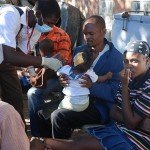More than 200 people have died and some 2,600 became infected in Haiti since a cholera outbreak was first reported last week. It was believed that contamination of the Artibonite River, which crosses Haiti’s rural center was at the source of the epidemic.
Cholera, which is caused by a bacterial infection in the small intestines, is typically spread by contaminated water and food. Thousands of people use the water from the Artibonite River for much of their daily activities including washing and cooking.
The rapid spread of the disease raised fears of a much larger health emergency, particularly if it reaches the camps around Port-au-Prince housing hundreds of thousands left homeless by the devastating earthquake on January 12. Already health officials say five cases of the disease have been detected in the capital.
An International Red Cross spokeswoman, Sophie Chavanel, who arrived Friday night in St.-Marc, said by telephone Saturday that doctors and nurses were rushing about, trying to treat people weakened with the severe vomiting and diarrhea that are the disease’s hallmarks.
“It is difficult to see,” said Ms. Chavanel, part of a team bringing potable water, water purification kits, plastic sheets, tents, mattresses and other supplies to the area. “It is really heartbreaking, actually.”
It is the Caribbean nation’s first cholera outbreak in more than a century.




